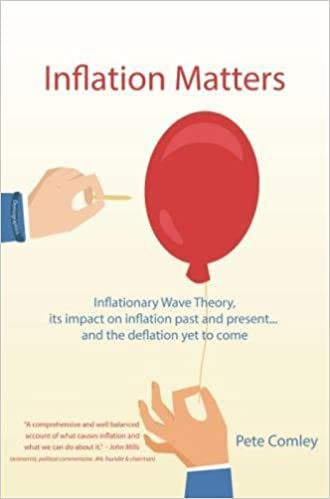For the average person, deflation, inflation, and even hyperinflation may seem quite murky or mysterious. However, it’s actually a lot easier than you’d think. With the right books, the idea of inflation can be broken down for you, and you can start to understand how monetary inflation works.
You might also like:
- How the FED Controls the Money Supply
- Money Multiplier
- Velocity of Money
- Agflation- What is it?
- Inflation and Velocity of Money
- What is the Real Definition of Inflation?
Here are 9 books that you have to check out if you want to understand more about inflation.
 1) Inflation Matters
1) Inflation Matters
by Pete Comley
Inflation Matters is a truly comprehensive book about inflation written in a simple and easy-to-read style. The book covers everything from the basics of how inflation is defined and measured to the impact of inflation and its winners and losers. This book was written to be easy to understand, so anyone who wants to learn about inflation can do so here. The book covers the history of inflation, how it’s calculated, and the impact that it has. It also covers deflation, and how that can be a problem for the economy. This book puts forward the Inflationary Wave Theory, detailing how our efforts affect inflation.
2) When Money Dies: The Nightmare Of The Weimar Hyperinflation
by Adam Fergusson
When Money Dies is the classic story of what happens when a nation’s currency depreciates beyond all hope of recovery. In history class, you may have been taught about how the Weimar Republic hyperinflation reduced the country to a barter economy. If you ever wanted to know more about how this happened and what it was like living under these conditions, then this is the book for you. Originally published in 1975, it’s still an excellent guide to how hyperinflation can happen.
3) This Time Is Different: Eight Centuries Of Financial Folly
by Carmen M. Reinhart and Kenneth S. Rogoff
This is another excellent history book, which is highly accessible and covers all kinds of financial crises that have happened throughout the world. Using clear, sharp analysis and comprehensive data, Reinhart and Rogoff document that financial fallouts occur in clusters and strike with surprisingly consistent frequency, duration, and ferocity. ‘You’ll learn everything from medieval currency to the modern subprime crisis, and how inflation affected them’ says writer Elena Dillon, from Boom Essays and State Of Writing.
4) The Inflation Myth And The Wonderful World Of Deflation
by Mark Mobius
Mark Mobius begins this book with an interesting 2007 story of the Argentine government firing its Director of Consumer Pricing Graciela Bevacqua for refusing to falsify their inflation statistics. From there he moves on to the 1700’s Bank of England, Chinese money growing on trees, Marco Polo, and a variety of other ways that history and inflation intersect.
This book also asks the question, ‘What if everything you learned about deflation was wrong?’ Mark Mobius posits that the theory that better technology results in cheaper products just isn’t correct. He covers how governments manipulate inflation to suit their needs, how difficult it is to measure inflation, and how using currencies as a measure of inflation just isn’t the best way of doing so.
5) The Economics Of Inflation: a Study Of Currency Depreciation In Post War Germany 1914 – 1923
by Constantino Bresciani-Turroni
This book is another that covers the hyperinflation in Post World War I Germany in great detail. For the translation, the author revised the work too, so this is the most up-to-date and comprehensive guide that you could imagine. You’ll also find an appendix that covers German economic conditions after the monetary reform, too.
6) The Behavioral Economics Of Inflation Expectations: Macroeconomics Meets Psychology
by Tobias F. Rotheli
As a guide to inflation, this book takes an interesting approach as it uses psychology to understand how we affect economics. ‘This is a very in-depth guide that uses experimental and historical data’ says economics blogger Daniel Winters, from Paper Fellows and Essayroo. ‘With that, you can see real analysis of economic events, such as the great depression.’
7) Fiat Money Inflation In France
by Andrew Dickson White
This is another historical book, covering how the rise of Napoleon Bonaparte was driven by a financial inflation in France. In 1789 there was a call for paper money, and this quickly gave rise to inflation. It’s required reading if you want to see how inflation affects different countries around the world.
8) Inflation: History And Measurement
by Robert O’Neill, Jeff Ralph, and Paul A. Smith
This book covers how inflation is measured and handled in the UK. It’s designed for newcomers to the idea, who may not understand financial jargon. The authors wanted to help the general public understand the reasoning for the prices of everyday essentials going up, so they can be better informed.
9) Monetary Regimes And Inflation: History, Economic and Political
by Peter Bernholz
As you’ve seen in these books, there are so many different things that can affect inflation. This book gives you an idea of what economic traits lead to inflation, and how they have happened throughout history. This is another perfect read for the newcomer to economic theory.
With these books, you’ll be able to get a good idea of how inflation works, and what affects it. Give some a try and start learning today.
About the Author: Emily Henry is a writer for UK Writings and Research paper writing service, as well as an editor for PhD Thesis Writing. She has a passion for teaching others about economics.


Leave a Reply